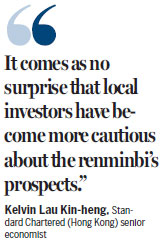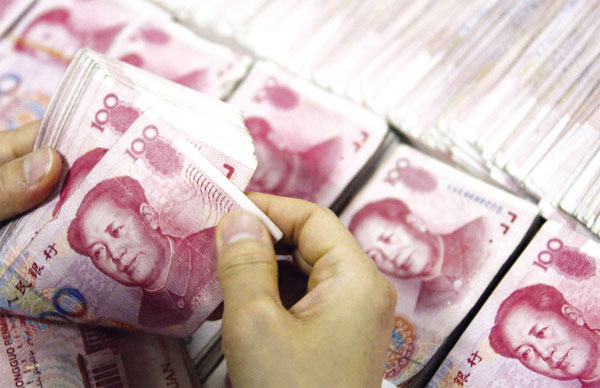Renminbi depreciation 'no big deal' for HK investors
Updated: 2015-09-08 08:30
By Luo Weiteng in Hong Kong(HK Edition)
|
|||||||||
|
The depreciation of renminbi will more or less help struggling mainland exporters to regain their price advantage in the US market. Asia News Photo |
Hong Kong investors continue to show great appetite for renminbi (RMB) and RMB-denominated assets despite the mainland currency's latest depreciation that sent shockwaves around the world, according to a survey by Standard Chartered Bank.
The RMB weakened by nearly 3 percent in August - its worst monthly performance on record - rattling investor confidence and igniting trading volatility, particularly in offshore markets.
The depreciation started with the mainland's central bank surprising the market by lowering the currency's midpoint against the US dollar by 1.9 percent on Aug 11.
Releasing the results of its survey on Monday, Standard Chartered Bank (Hong Kong) found that although 60 percent of local investors believe the RMB would further depreciate in the next 12 months - a significant increase from the 5 percent who had the same expectation last year - more than 70 percent said they would continue to hold or even expand their RMB portfolio in the coming year.
The poll, which was conducted after the currency's substantial depreciation, covered 527 Hong Kong investors whose average value of RMB products had gone up by more than 30 percent last year to an average of about HK$100,000.
"It comes as no surprise that local investors have become more cautious about the renminbi's prospects," said Standard Chartered (Hong Kong) senior economist Kelvin Lau Kin-heng.

However, in the long run, local investors continue to show confidence in the mainland market and are aware of the investment opportunities in the world's second-largest economy, with up to 83 percent of investors believing a balanced investment portfolio could include investments in the mainland market, and that 76 percent of them hoped to capture the vast investment opportunities and potential returns brought about by the country's economic reform.
In a bid to calm jitters, People's Bank of China Governor Zhou Xiaochuan has sought to dispel fears of a further depreciation of the RMB.
He told a meeting of G20 finance ministers and central bank governors in Turkey that the RMB's exchange rate against the US dollar "tends to be stable".
"The nearly 2 percent of the renminbi's depreciation on Aug 11 is more of a sporadic one-off adjustment, which could hardly be seen for some time to come," noted Will Leung Chun-fai, head of investment strategy at Standard Chartered Bank (Hong Kong), who expects the onshore renminbi to hit 6.5 against the greenback by yearend. But, he believes the central bank would prevent the RMB from losing ground against the US dollar any further.
In the near term, Leung pointed out, it would become a commonplace for the RMB to move up and down, with its daily exchange rate volatility expanding from 2 percent to 3 percent.
"The RMB used to be regarded as a stable investment tool for investors, but this is no longer the case," he said. "Yet, things are not going to be as bad as people imagine. With a slew of measures taken by the authorities to stabilize the economy, the renminbi and related products are still worthy of investors' attention, especially products offering stable returns that can help offset the risk of further volatility in the exchange rate."
Over the past eight-and-a-half years, the RMB has appreciated by more than 20 percent against the US dollar and strengthened by more than 40 percent against a basket of major currencies.
To some extent, Lau said it's reasonable for the mainland to help its struggling exporters by giving them a price advantage by depreciating a strong RMB.
UBS economist Wang Tao estimated in a report that the RMB's exchange rate is still overvalued by about 5 to 10 percent. The Swiss banking giant maintains its projection that the RMB will be traded at 6.5 to the US dollar by the end of the year, but has revised its forecast for the currency to weaken to 6.8 from a previously expected 6.6 to the greenback by the end of next year.
sophia@chinadailyhk.com
(HK Edition 09/08/2015 page7)
